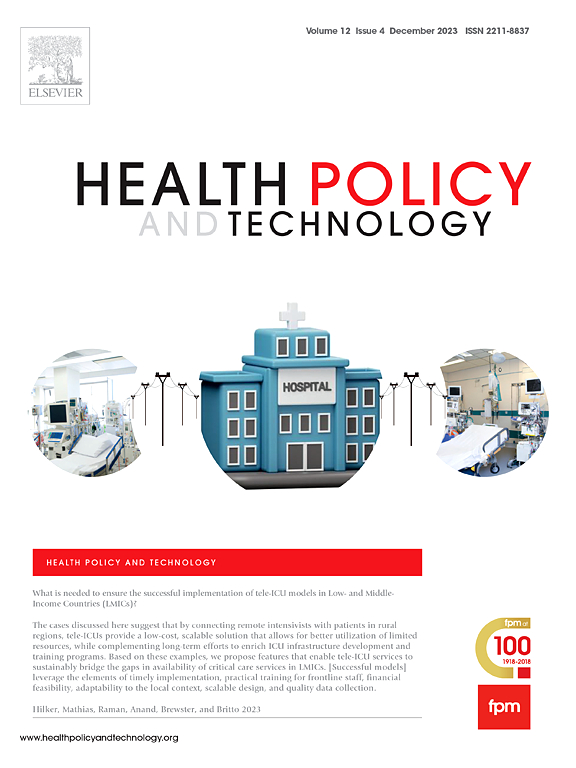Bridging the gap: Understanding preferences and perceived benefits of an mHealth app for GDM self-management
IF 3.4
3区 医学
Q1 HEALTH POLICY & SERVICES
引用次数: 0
Abstract
Objectives
Mobile health (mHealth) solutions to support pregnant women's self-management are increasing. Concerns exist on the extent real-world design and implementation of mHealth applications for pregnant women account for diverse cultural backgrounds and religious practices. This study aimed to (1) explore the challenges in complying and adhering to Gestational diabetes mellitus (GDM) self-management regimens for women from diverse backgrounds; and (2) women's perceptions of culturally tailored features for GDM mHealth apps and their possible contribution in addressing the challenges they experience.
Methods
Semi-structured interviews were conducted on pregnant women diagnosed with GDM in a diabetes-in-pregnancy clinic located in Israel's northern periphery. A content analysis method was used to analyze and interpret the data, and code it into themes.
Results
A total of 24 pregnant women diagnosed with GDM participated in the study. Of the 24 women, 18 (75 %) were Jewish, 5 (21 %) were Muslims, and 1 (4 %) was Christian. Four main themes were derived from the interviews: (1) GDM self-management challenges (2) Cultural and religious conflicts (3) Experience with the use of digital technologies, and (4) Desirable mHealth features. Common needs included better communication with healthcare providers and dietary guidance. Unique challenges and conflicts arose from cultural and religious practices, such as Ramadan fasting schedules, avoiding technology on the Sabbath for blood sugar monitoring, and unavailable kosher-certified food products that aligned with dietary recommendations. Some women also found apps “too secular” and preferred culturally sensitive features.
Conclusions
mHealth can improve GDM self-management by integrating culturally tailored features such as fasting-specific guidance, Sabbath-compliant modes, or searchable databases for culturally appropriate nutritional options. Addressing these barriers may enhance adherence and support GDM self-management.
Lay Summary
Gestational diabetes mellitus (GDM) is a common complication during pregnancy, requiring self-care and lifestyle changes for better control of blood sugar levels. While mobile health (mHealth) solutions supporting healthcare providers and women for improving self-management are becoming popular, existing apps often do not address women's personal or cultural needs. We interviewed pregnant women regarding their experience with digital tools. Women expressed that dietary restrictions and cultural beliefs made it difficult to self-manage their GDM. Yet, they identified that if mHealth apps addressed their personalized treatment plan and allowed asynchronous communication with the healthcare providers it would assist them in managing their GDM. Therefore, mHealth app developers along with health policy, need to promote development and implementation of personalized digital tools that can improve the health outcomes for both mothers and their offspring.
弥合差距:了解GDM自我管理的移动健康应用程序的偏好和感知好处
目的支持孕妇自我管理的移动医疗(mHealth)解决方案正在增加。人们关注的是,孕妇移动医疗应用程序的实际设计和实施在多大程度上考虑了不同的文化背景和宗教习俗。本研究旨在(1)探讨不同背景的女性在遵守和坚持妊娠糖尿病(GDM)自我管理方案方面面临的挑战;(2)女性对GDM移动健康应用的文化定制功能的看法,以及这些功能在解决她们面临的挑战方面可能做出的贡献。方法采用半结构化访谈对以色列北部边缘一家妊娠期糖尿病诊所诊断为GDM的孕妇进行访谈。采用内容分析法对数据进行分析和解读,并将其编码为主题。结果共有24名确诊为GDM的孕妇参与了本研究。在这24名女性中,18名(75%)是犹太人,5名(21%)是穆斯林,1名(4%)是基督徒。从访谈中得出四个主题:(1)GDM自我管理挑战;(2)文化和宗教冲突;(3)使用数字技术的经验;(4)理想的移动健康功能。共同的需求包括与医疗保健提供者更好的沟通和饮食指导。独特的挑战和冲突来自文化和宗教习俗,例如斋月禁食时间表,避免在安息日使用技术进行血糖监测,以及无法获得符合饮食建议的犹太认证食品。一些女性还认为应用程序“太世俗”,更喜欢具有文化敏感性的功能。结论smhealth可以通过整合文化定制的功能,如禁食指导、符合安息日的模式或适合文化的营养选择的可搜索数据库,改善GDM的自我管理。解决这些障碍可以增强依从性并支持GDM的自我管理。妊娠期糖尿病(GDM)是妊娠期常见的并发症,需要自我护理和改变生活方式来更好地控制血糖水平。虽然支持医疗保健提供者和女性改善自我管理的移动医疗(mHealth)解决方案正变得越来越流行,但现有的应用程序往往无法满足女性的个人或文化需求。我们采访了孕妇,了解她们使用数字工具的经验。女性表示,饮食限制和文化信仰使她们难以自我管理自己的GDM。然而,他们发现,如果移动健康应用程序解决了他们的个性化治疗计划,并允许与医疗保健提供者进行异步通信,这将有助于他们管理他们的GDM。因此,移动健康应用程序开发者和卫生政策需要促进个性化数字工具的开发和实施,以改善母亲及其后代的健康状况。
本文章由计算机程序翻译,如有差异,请以英文原文为准。
求助全文
约1分钟内获得全文
求助全文
来源期刊

Health Policy and Technology
Medicine-Health Policy
CiteScore
9.20
自引率
3.30%
发文量
78
审稿时长
88 days
期刊介绍:
Health Policy and Technology (HPT), is the official journal of the Fellowship of Postgraduate Medicine (FPM), a cross-disciplinary journal, which focuses on past, present and future health policy and the role of technology in clinical and non-clinical national and international health environments.
HPT provides a further excellent way for the FPM to continue to make important national and international contributions to development of policy and practice within medicine and related disciplines. The aim of HPT is to publish relevant, timely and accessible articles and commentaries to support policy-makers, health professionals, health technology providers, patient groups and academia interested in health policy and technology.
Topics covered by HPT will include:
- Health technology, including drug discovery, diagnostics, medicines, devices, therapeutic delivery and eHealth systems
- Cross-national comparisons on health policy using evidence-based approaches
- National studies on health policy to determine the outcomes of technology-driven initiatives
- Cross-border eHealth including health tourism
- The digital divide in mobility, access and affordability of healthcare
- Health technology assessment (HTA) methods and tools for evaluating the effectiveness of clinical and non-clinical health technologies
- Health and eHealth indicators and benchmarks (measure/metrics) for understanding the adoption and diffusion of health technologies
- Health and eHealth models and frameworks to support policy-makers and other stakeholders in decision-making
- Stakeholder engagement with health technologies (clinical and patient/citizen buy-in)
- Regulation and health economics
 求助内容:
求助内容: 应助结果提醒方式:
应助结果提醒方式:


